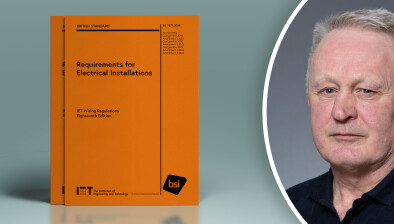Retentions ‘disproportionately penalise small businesses’, SELECT tells UK-wide radio audience
The managing director of Scotland’s largest construction trade association SELECT took to the airwaves last week to tell thousands of tradespeople across the UK that retentions “disproportionately penalise small businesses” in the construction industry.

Speaking on the popular Thomas Nagy Electrical Show on Fix Radio, Alan Wilson said it was time to do away with the “outmoded system”.
And he said it was vital for the whole sector, including Tier 1 contractors, public sector clients and small businesses, to sign up to a solution to the “clunky and difficult” practice which he said has bedevilled the sector for years.
Mr Wilson told listeners: “Construction is one of the few sectors operating this system. The principal being that clients and main contractors hold back a sum of money in case contractors do not complete the works they are contracted to do, is understandable, but in many cases now it is simply used to enhance cash flow, Carillion being the obvious example.
“The fact is that it is a clunky and difficult means of contract completion which disproportionately penalises small businesses. It effectively has become an opportunity for certain bodies to penalise sub-contractors.
“Every part of the construction has its own issues with retentions, depending on where they are in the supply chain. For instance, electricians and plumbers work near the end of a contract, whereas ground workers are at the beginning and, in some cases, might have to wait years before a client pays on completion.”
Mr Wilson’s comments came just weeks after an in-depth review by the short life working group (SLWG) on retentions in Scotland, which made a number of practical recommendations to deal with the issue of cash retentions.
While welcoming the initiative, Mr Wilson told Thomas that SELECT would like the government to put retention monies into trust in the short term and do away with the system completely in the longer term, to remove uncertainties for business.
He highlighted Build UK’s ambition to outlaw retentions by 2025, but said that prohibition has been tried in the US, in New Mexico particularly, but was replaced by a Contract Completion Guarantee Fund, which was a retention system by another name.
He added: “What we have to remember is that retentions take money out of the industry which cannot then be reinvested. Companies cannot invest in resources such as people, or apprenticeships, or even new or updated vans. If they cannot reinvest, the whole economy suffers.”
The SLWG was established in Scotland in January by the Minister for Business, Fair Work and Skills to consider and make recommendations on the practice of cash retentions under construction contracts.
Among its many practical proposals submitted to the Scottish Government, the new report recommends a retention deposit scheme, the introduction of best practice policy and automatic release of retentions as early as possible.
Its findings have also been warmly welcomed by fellow Scottish trade body the Scotland and Northern Ireland Plumbing Employers’ Federation (SNIPEF) and engineering services alliance Actuate UK, of which SELECT and SNIPEF are both key members.
Mr Wilson’s comments came when he was a guest on Thomas Nagy’s show, sponsored by Schneider Electric, on Thursday 26 August. Thomas is an electrical YouTuber with 90,000 people as a subscriber base, while Fix Radio has a listener base of around 500,000 people over the course of the week.
-
Listen to the show again here.
















